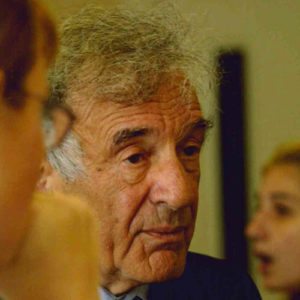I remember the first day of class when Elie Wiesel walked in. We were completely stunned and silent, not expecting him on the first day. We went around introducing ourselves and providing an example of a “metamorphosis” moment since it was our class theme. We spoke about our lives, which brought many of us to tears. He commented, “No one spoke about love, very interesting.” He seemed impressed then proceeded to tell us about his youth and his comical journey for love being such hard work.
I’ve never met a more endearing, modest, passionate person. His emphasis on the idea of telling a story was enriching, which makes it funny that Professor Johnston’s friend Wayne Flynt said the same thing. A person’s story is vital, and when someone tells you his story, you have a responsibility to continue telling it as well, because now his story is part of yours—and once a story is lost, it’s as if the person and what he went through is too.
His passion and admiration for children always stayed with me, because I too completely adore children viewing the world with their expansive imaginations. So Elie Wiesel completely inspired me with his anger and pain regarding children’s youth and innocence being taken away too soon, something he experienced firsthand. There are many stories, life lessons, quotes he shared—but the most influential is the idea that indifference is probably the worst disease, thinking, feeling there is; because when you do nothing, say nothing, you help the oppressor!
—Brianna Dickinson ’13


